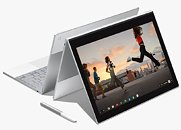Monday, November 27th 2017

Microsoft Office Makes it to Chromebooks, Still Eludes Other Linux Distros
Microsoft released one of its key software products, Microsoft Office, to all Chromebooks. Office for Android is now available on all Google Play-enabled Chromebooks. Chrome OS is derived from Android, which itself is a Linux-based operating system. Like the rest of the Android software ecosystem, Office for Android eludes other desktop Linux distributions, due to lack of the required APIs and other quasi-proprietary dependencies exclusively found on Android and Chrome OS.
Microsoft Office is one of the "killer apps" that keep Windows popular. It's been available on the Apple Mac platform for over a decade, and made its long march to the Android platform with the decline of Microsoft's Windows Mobile platform. It should finally make premium chromebooks, such as the Google Pixelbook (pictured below), worth the buy to business professionals on the move.
Source:
ChromeUnboxed
Microsoft Office is one of the "killer apps" that keep Windows popular. It's been available on the Apple Mac platform for over a decade, and made its long march to the Android platform with the decline of Microsoft's Windows Mobile platform. It should finally make premium chromebooks, such as the Google Pixelbook (pictured below), worth the buy to business professionals on the move.

17 Comments on Microsoft Office Makes it to Chromebooks, Still Eludes Other Linux Distros
Why? Why would office on chrome OS make any difference, when for the same price you can get a proper business laptop with better battery life, hardware that can be replaced and upgraded, and an OS that can run on a domain, install third party software, and isnt limited to 5 years of updates by google's dumb update policies?
Office doesnt fix the systemic issue of chrome OS not being a fully fledged OS. Business professionals need a proper machine to do work, not a glorified facebook/google data mining machine running a web browser.
But users like him might be a minority. Not sure. People who use Office, but don't want or know anything else about computers.
As for myself, it'll never happen. I'm a gamer.
EDIT; Not trying to pick a fight, only correct a few bits of information. I was working on Mac's and PC's at the time and was present for those releases. Your statement seemed a bit off, that's all